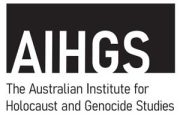You Can't Stop What You Don't Understand
Aboriginal prisoners outside Roebourne Gaol,
1896. State Library of Western Australia, 303666PD.
Aboriginal prisoners outside Roebourne Gaol,1896. State Library of Western Australia, 303666PD.
You Can't Stop What You Don't Understand
Who We Are
The Australian Institute for Holocaust and Genocide Studies comprises academics located across Australia. We are a not-for-profit organisation engaged in education, primary research, teaching and promoting remembrance and commemoration. We are dedicated to combating racism, hatred and prejudice by fostering tolerance and understanding through education.
25+ years of Holocaust and genocide studies research, teaching, publication experience.
Since inception, Institute Associates or Members have initiated or taught our courses, for varying lengths of time, in seven universities in NSW, the ACT and Qld in addition to public venues.
90+ publications – books, articles, CDs, written, edited or compiled by Institute Associates to date.
Objectives of the Australian Institute for Holocaust and Genocide Studies
(a) to undertake teaching, education and research in the field of Holocaust and genocide studies
(b) to support and conduct ongoing community and public education programmes through electronic and face to face modes of delivery. These may include courses, talks, lectures and commemorative ceremonies;
(c) to facilitate the transfer of Holocaust and genocide studies research skills to new generations of scholars, including and especially to survivors and descendants of victim communities;
(d) to actively foster and support research, public commemoration and acknowledgement of victims of genocide living in Australia, including Australia’s first peoples, with the aims of promoting reconciliation, mutual respect and tolerance;
(e) to support, assist, sponsor or maintain undergraduate teaching, develop postgraduate courses and supervise higher degree work in this field throughout Australia;
(f) to support, assist, sponsor or develop curricula for educators in secondary and tertiary institutions;
(g) to undertake and foster consultancy work of an academic nature;
(h) to support the publication of works by experienced and emerging scholars in the genocide studies field;
(i) To collaboratively support Members and Associates of the Institute in their work in the field with assistance in research activity, course preparation and delivery, through attendance and presentation of papers at conferences and academic venues;
(j) to provide a consultative resource and clearing-house facility, dependent on individual expertise at any given time, to serve community, media and academic interest;
(k) to raise funds for library and teaching resources facilitating study and research in this area as well as scholarships for students and scholars interested in further education or research opportunities;
(l) to undertake any activities that further the objectives listed above.
Broad Research Areas Include:
- Analysing the motives for and the ideological bases of such group-specific killings across the spectrum of antiquity, the middle ages and modernity;
- Studying specifically the relationship between racism and genocide;
- Investigating the relationship between modernity and genocide;
- Examining the socio-political conditions under which such mass killings can and do occur;
- Evaluating the pre-requisites for the perpetration of genocide;
- Attempting to locate legal and moral responsibility for genocidal policy and practice;
- Addressing the assumption that there are ‘worthy and unworthy victims’;
- Investigating the nature and essence of ‘colonial ethnocide’;
- Analysing possible guards and safeguards against potential genocides and repetitions of genocide;
- Analysing, exposing and refuting that form of historical revisionism that seeks to hide or deny genocide
- Evaluating the use and effectiveness of ‘humanitarian intervention’ as a viable process for groups at risk







